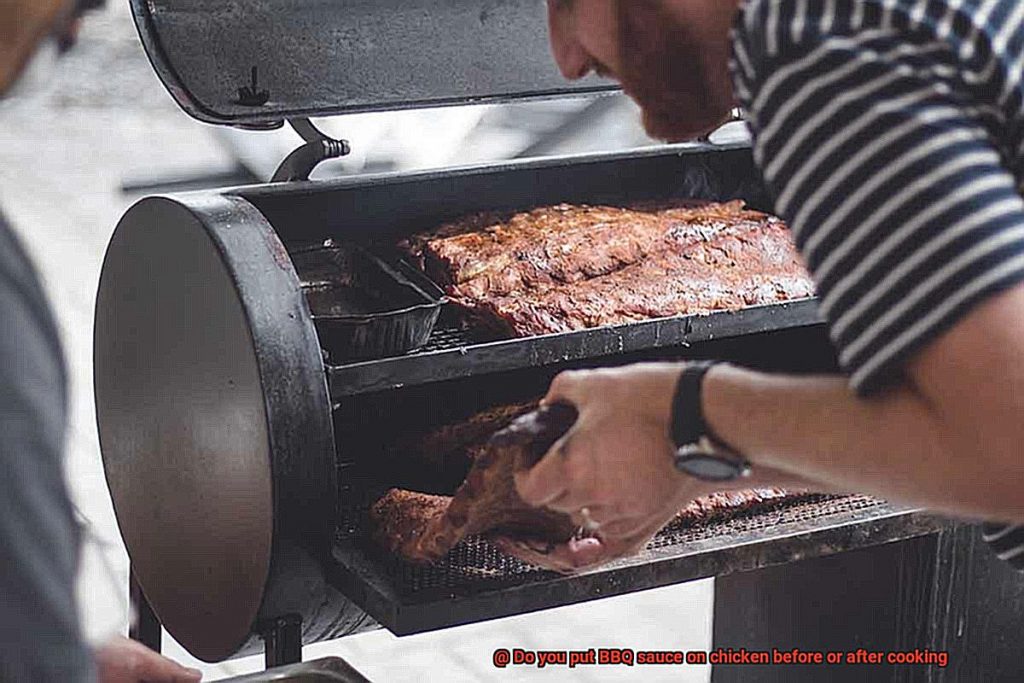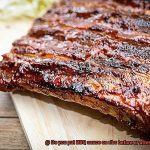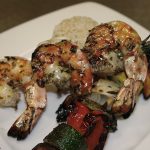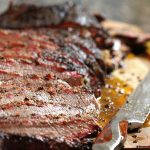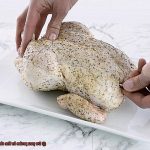As summer approaches, our thoughts turn to outdoor cooking and one of the biggest days on the calendar: Barbecue day. And what’s a barbecue without BBQ sauce on grilled chicken? But here’s the dilemma: do you put BBQ sauce on before or after cooking?
The answer is it depends on personal preference and the type of barbecue sauce being used. Some swear by marinating their chicken in BBQ sauce before grilling or roasting, while others stick to applying it after cooking. So which method is best?
In this blog post, we’ll explore the pros and cons of both methods and discuss the factors that determine which approach works best for different types of BBQ sauce and chicken preparations. Whether you’re looking for that perfect char-grilled flavor or a juicy, saucy bite, we’ve got you covered.
So, let’s dive into the juicy details of this age-old barbecue debate.
Contents
Factors to Consider When Deciding Whether to Put BBQ Sauce on Chicken Before or After Cooking
Grilling chicken is an art form, and one of the most debated topics in this arena is whether to apply BBQ sauce before or after cooking. While there is no one-size-fits-all answer, there are a few critical factors to consider that can help you achieve the best results.
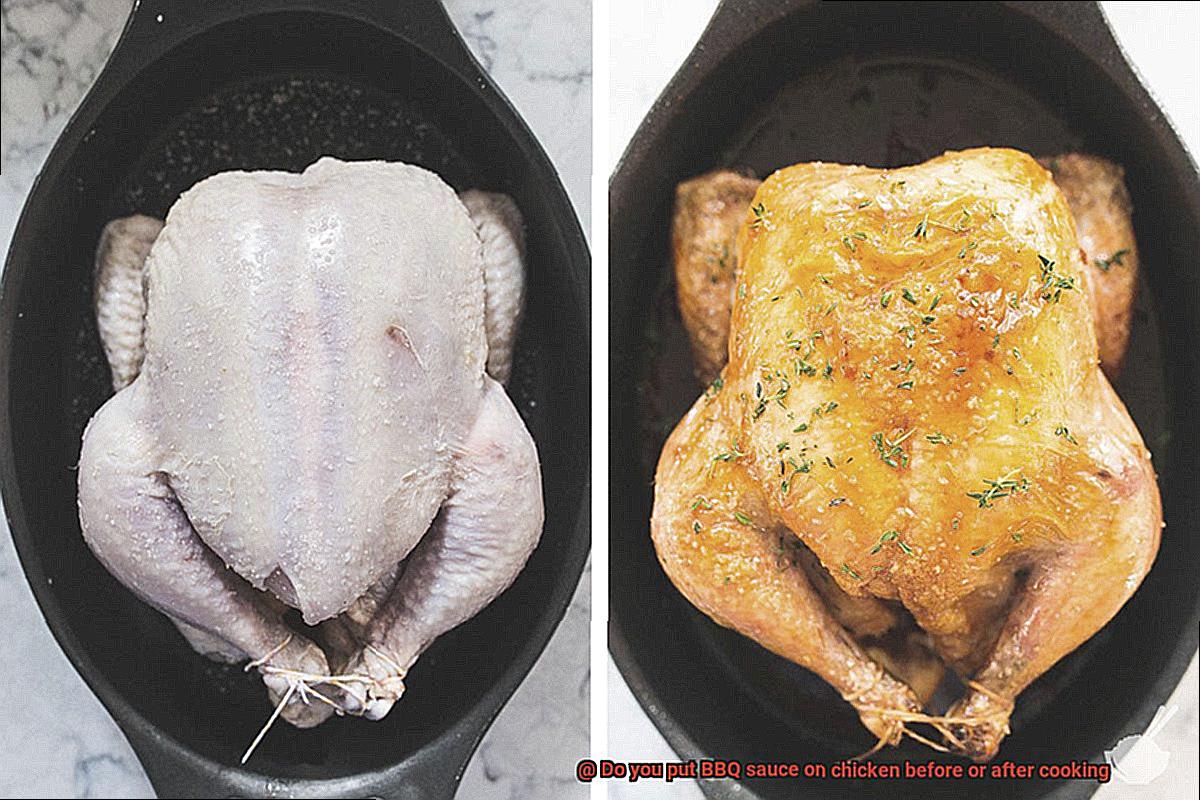
First and foremost, consider the cooking method you plan to use. If you’re grilling your chicken, it’s generally best to wait until the last few minutes of cooking to apply the sauce. BBQ sauce often contains sugar, which can burn quickly on the grill and create an unpleasant charred taste. Waiting until the end of cooking allows you to achieve a flavorful glaze without risking burned sauce.
The thickness of the sauce is another crucial factor to consider. Thicker sauces are more likely to burn, so it’s best to apply them towards the end of cooking. Thin sauces can be applied earlier in the cooking process without as much risk of burning.
The type of BBQ sauce you use can also play a role in when to apply it. If your sauce contains vinegar or citrus juice, it can help tenderize the chicken if applied before cooking. However, if your sauce is primarily based on ketchup or tomato paste, it’s best to wait until the end of cooking to prevent burning.
Consider your desired outcome as well. If you prefer a caramelized exterior on your chicken, applying BBQ sauce early in the cooking process can create a sweet and savory glaze. However, if you prefer a crispy exterior, waiting until the end of cooking to apply the sauce can help achieve that desired texture.
It’s essential to note that if you’re using a high-sugar BBQ sauce, be sure to monitor your chicken closely and adjust your cooking time accordingly. Additionally, if you’re using a marinade or dry rub, it’s best to apply those before cooking and save the BBQ sauce for later application.
Pros and Cons of Putting BBQ Sauce on Chicken Before Cooking
The decision to apply BBQ sauce before cooking is a debate that has been raging for years. But fear not, as an expert in this field, I can tell you that there are both pros and cons to consider before making your decision.
Let’s start with the pros. Applying BBQ sauce before cooking allows the chicken to absorb more flavor as it cooks, resulting in a juicy and delicious end product. The sugars in the sauce caramelize on the outside of the chicken, creating a crispy and mouth-watering crust.
Time-saving is another benefit of applying BBQ sauce before cooking, as there’s no need to constantly baste the chicken while it’s on the grill.
However, with every pro comes a con. One downside to consider is burnt sauce. Due to its sugar content, BBQ sauce can burn quickly when exposed to high heat, resulting in an unpleasant taste. Flare-ups are another potential issue that can arise from applying BBQ sauce before cooking.
The sugar in the sauce can cause uneven cooking and potentially ruin your chicken. Texture is also a factor to consider since some people prefer their chicken to have a crispy texture which can be hindered by applying BBQ sauce before cooking.
Ultimately, it comes down to personal preference when deciding whether or not to apply BBQ sauce before cooking. If you’re looking for a juicy and flavorful end product with a crispy crust, then go ahead and apply your BBQ sauce before cooking.
Just be sure to monitor it closely to prevent burning or flare-ups. However, if you prefer your chicken crispy without any added flavors, then skip applying the sauce before cooking altogether.
Pros and Cons of Putting BBQ Sauce on Chicken After Cooking
Today, we’re tackling the age-old debate of when to apply BBQ sauce to chicken. Specifically, we’ll be exploring the pros and cons of applying it after cooking. As someone who has spent countless hours experimenting with different BBQ techniques, I’m excited to share my insights on this topic.
Let’s start with the pros. Applying BBQ sauce after cooking can help your chicken retain moisture by acting as a sealant. This prevents the juices from escaping and drying out the meat. Additionally, it allows for more control over the amount of sauce used, so you can adjust it to your taste preferences without overwhelming the dish.
Another benefit of post-cooking BBQ sauce application is that it can lead to caramelization of the sauce. This creates a sweet and smoky flavor profile that can take your chicken to the next level. Plus, since the sauce isn’t cooked for an extended period, its flavors remain intact and are more potent.
However, there are also some cons to consider. One drawback is that applying BBQ sauce after cooking can result in an uneven coating on the chicken. The sauce may not stick well to some areas of the meat, leading to some bites being saucier than others.
Another potential downside is the risk of burning your chicken. The sugar content in BBQ sauce can quickly caramelize and burn if exposed to high heat for too long. This not only affects the taste but can also ruin the presentation of your dish.
Lastly, applying BBQ sauce after cooking can be messy and result in a sticky eating experience. It doesn’t allow for proper integration of flavors between the meat and sauce that you would get if you applied it before cooking.
High-Sugar BBQ Sauces: How to Avoid Burning
First and foremost, it’s crucial to choose the right BBQ sauce for the job. Look for a sauce with a lower sugar content or one that is specifically designed for grilling. These types of sauces are thicker and stickier, which helps them cling to the chicken without burning.
In addition to choosing the right sauce, applying it in layers is also essential. Instead of slathering on a thick layer all at once, start with a thin layer and add more as the chicken cooks. This technique allows the sauce to cook into the meat and create a more even coating.
Monitoring the heat of your grill is also important. If the heat is too high, the sugar in your BBQ sauce will burn quickly. Try lowering the heat slightly and cooking your chicken for a longer period of time to ensure that the sauce has time to cook into the meat without burning.
If you’re still struggling with burning BBQ sauce, consider using indirect heat. This means placing the chicken on one side of the grill while leaving the other side empty. This allows the chicken to cook through without being directly exposed to the heat source, which can cause burning.
Marinades and Dry Rubs: When to Apply
Get ready to elevate your grilled chicken game with the powerful flavor of marinades and dry rubs. The question remains, however: when should you apply them? As a trusted expert in all things grilling, let me break it down for you.
Let’s start with marinades. These flavor-packed blends consist of acidic liquids, oils, and seasonings that work together to tenderize and infuse your chicken with delectable flavors. But beware. Leaving your chicken in a marinade for too long can actually make it tough and stringy. Stick to marinating for a maximum of 24 hours, and you’ll be golden.
Now, let’s talk dry rubs. These spice blends are rubbed onto the surface of the chicken, creating a delicious crust and adding texture to your meat. You can apply dry rubs just before cooking or up to 24 hours in advance. However, if you choose to apply them in advance, be sure to store your chicken in a sealed container in the fridge.
When it comes to BBQ sauce, things get a little tricky. If you’re using a marinade, wait until the end of the cooking process to apply your BBQ sauce. This will prevent any sugars in the sauce from burning and ruining your dish. On the other hand, if you’re using a dry rub, feel free to apply BBQ sauce before or after cooking. Applying BBQ sauce before cooking will give you a sticky glaze while applying it after cooking will give you that classic BBQ flavor.
Remember to monitor your grill heat like a hawk and choose a thick BBQ sauce for maximum flavor. Here’s a quick summary of when to apply marinades, dry rubs, and BBQ sauce:
- Marinades: Apply for a maximum of 24 hours
- Dry Rubs: Apply just before cooking or up to 24 hours in advance
- BBQ Sauce with Marinades: Apply towards the end of the cooking process
- BBQ Sauce with Dry Rubs: Apply before or after cooking for different flavors
Experimenting with Different Methods for the Best Results
Let’s shake things up and experiment with different methods to achieve the best results.
Firstly, let’s talk about the ever-popular method of marinating your chicken in BBQ sauce before grilling. This method allows the flavors to seep into the meat, creating a bold and delicious taste. However, be cautious not to over-marinate, as it can result in soggy chicken. I recommend marinating for no more than 24 hours to avoid this.
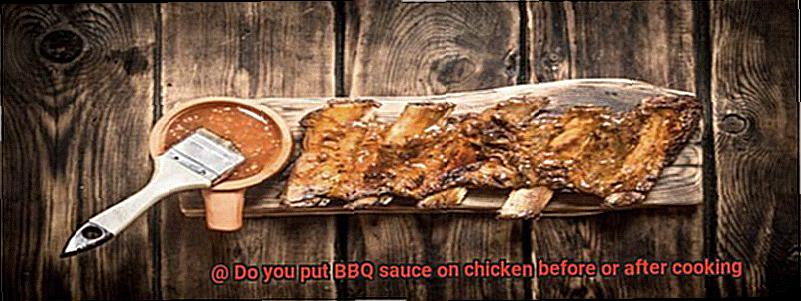
Alternatively, you can opt for brushing on the BBQ sauce while your chicken is cooking on the grill. This method gives your chicken a crispy glaze on the outside while keeping the inside moist and tender. It’s a crowd-pleaser for a reason.
Lastly, some prefer to apply BBQ sauce after cooking their chicken. This method allows for more control over how much sauce is added and can prevent burning or charring of the sauce. It’s important to keep in mind that different sauces may require different methods of application, so read recipe instructions carefully.
Experimentation is key to finding what works best for your taste buds. Don’t be afraid to try new things and mix it up with different sauces and methods. Remember, there’s no wrong way to enjoy that smoky, savory flavor.
6z5Sur9-WN4″ >
Conclusion
After much debate and consideration, the answer to whether you should put BBQ sauce on chicken before or after cooking is not a simple one. It all comes down to personal preference and a few key factors.
For those grilling chicken, it’s best to apply the sauce towards the end of cooking to prevent burning and achieve a mouth-watering glaze. The type of BBQ sauce used also plays a crucial role in determining when to apply it. High-sugar sauces can burn quickly, so it’s important to monitor the heat and apply them in layers for optimal flavor.
On the other hand, applying BBQ sauce before cooking allows for more flavor absorption and creates a crispy crust. However, this method can lead to uneven coating and burnt sauce. Applying BBQ sauce after cooking helps retain moisture and can result in caramelization of the sauce but may also lead to an uneven coating.
When using marinades or dry rubs, applying them before cooking is recommended while BBQ sauce with marinades should be applied towards the end of cooking. Experimentation with different methods such as marinating in BBQ sauce, brushing it on while grilling or applying after cooking is key to finding what works best for individual taste buds.
In conclusion, perfecting your chicken’s flavor profile requires some experimentation and knowledge of these tips and tricks. Whether you prefer juicy chicken with a crispy exterior or saucy with a sweet glaze – now you know how to achieve both.

